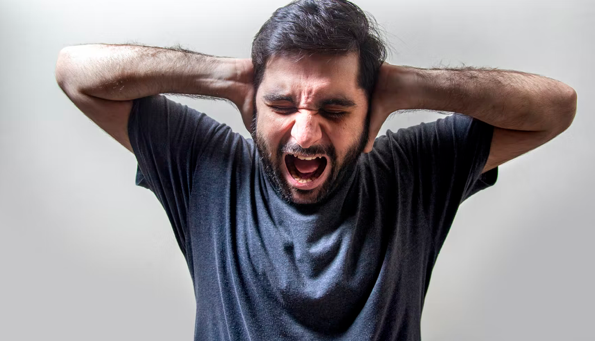Selective sound sensitivity is a syndrome, where certain sounds trigger emotions and cause an extreme outbreak. This condition is quite common in the US and popularly known as misophonia. If the doctor says that you are suffering from misophonia, it means you have selective sound sensitivity syndrome.

(Source)
People often struggle to control their emotions with Misophonia and violently lash out whenever they hear triggering sounds. The common symptom of this condition is aggression, anger, and irritation.
Selective Sound Sensitivity – Symptoms
Some of these reactions seen in misophonia are:
- Annoyance
- Avoidance
- Anger
- Physical and verbal aggression
Some experts suggest that the response of a person suffering from misophonia is a fight or flight response, while others consider it automatic. The fight or flight response or acute stress response is a natural response of your body to handle threatening conditions. You will also experience these symptoms:
- Pupils dilation
- Muscles tightness
- Blood vessels constrict
- Increase in a heartbeat and breathing
- Increase in alertness and awareness
Selective Sound Sensitivity – Diagnosis
Specialist don’ have specific diagnostic guidelines to follow for Selective Sound Sensitivity. Even Diagnostic and Statistical Manual of Mental Disorders, Fifth Editions doesn’t contain official diagnosis criteria.

(Source)
According to the research, Misophonia resembles some psychiatric conditions such as intermittent explosive disorder, OCD, and specific phobias. However, the entire patterns and symptoms of this condition don’t resemble misophonia. Here are some diagnostic criteria of Selective Sound Sensitivity:
- Considering certain sounds like anger, irritation, and disgust
- Loss of control due to anger
- Significant distress that disrupts normal activities
- Tolerating triggering sounds with extreme discomfort, anger, and disgust
- Other medical conditions or mental disorders don’t have the same feeling
Since professionals didn’t recommend any official diagnostic criteria, doctors can evaluate the treatment through their experience and skills. After diagnosis, they will use different techniques and therapies to reduce the symptoms.
Selective Sound Sensitivity – Treatment
Misophonia is a condition without established treatments by professionals. That is why you cannot receive complete treatment for this irritating condition. But, that doesn’t mean you cannot seek relief from misophonia. Several doctors use different treatments to reduce misophonia symptoms. Here are some of the treatments:
1. Cognitive Behavioral Therapy (CBT)
Doctors use this treatment option to reduce negative thoughts like with a certain sound. In this treatment, the doctor identifies the triggering sounds to reduce your response to them. According to a Journal of Affective Disorders study, about 50% of misophonia patients found CBT effective. They were able to reduce their symptoms after taking therapies.
2. Medications
You cannot find approved medications for misophonia treatment as there are few studies for this condition. But, doctors will prescribe medication to reduce related conditions, such as depression or anxiety.
3. Tinnitus Retraining Therapy (TRT)
In this treatment method, doctors recommend a sound device to divert your attention from triggering sounds. This approach will help you ignore the noises and minimize automatic stress response. TRT treatment is common for Tinnitus patients.
Selective Sound Sensitivity & Treatment: Conclusion
People with Selective Sound Sensitivity such as misophonia struggle to control their responses to certain sounds. But, various treatments can reduce their sound triggers. Some therapies use auditory distraction techniques to improve an individual’s response, others utilize a psychological approach.
If you think you have Selective Sound Sensitivity, then you should visit a reliable sound specialist, Stephen Geller Katz. He has more than 30 years of experience treating sound conditions such as Misophonia and tinnitus.
Contact Dr. Katz to learn more about this condition and treatment options today:
Stephen Geller Katz
19 West 34th Street
Penthouse Floor
New York, NY 10001
646-585-2251
Tele-Video Sessions
Speak 5 languages
International Patients Welcome
